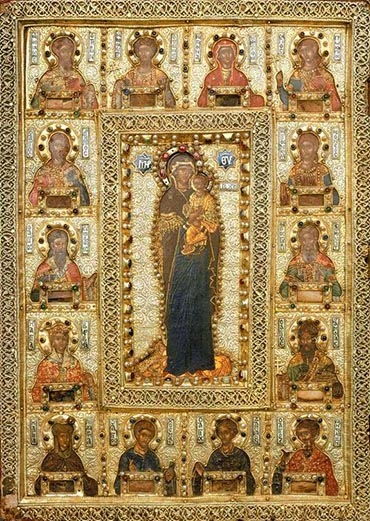
![]()
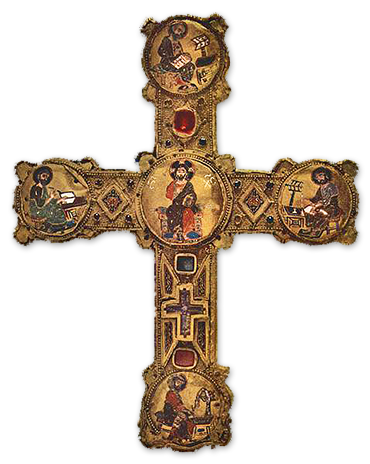
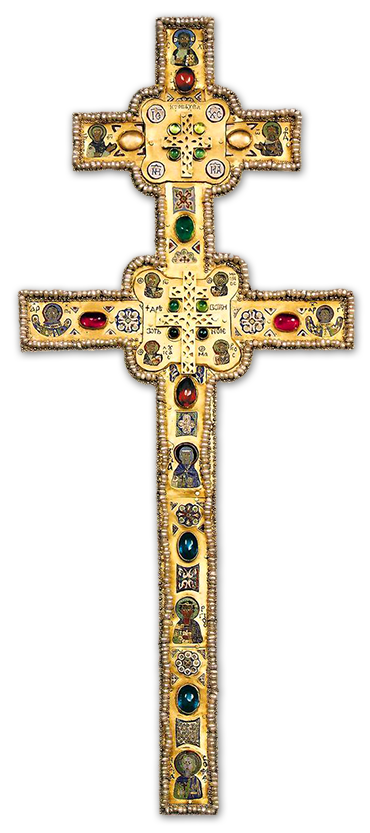
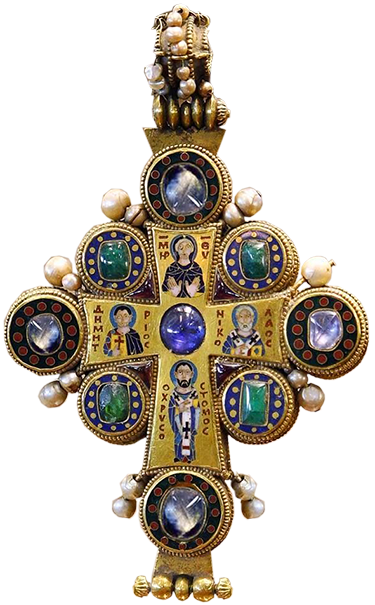

SERVICE of the DIVINE LITURGY in the GREAT CHURCH of CHRIST in CONSTANTINOPLE
I. The Typika and Beatitudes
• On every Sunday, we must chant the Typika and the Beatitudes with 8 hymns for the Resurrection in the tone of the week.
• If a feast of Our Lord or the Theotokos falls on a Sunday, we chant 8 hymns for the Beatitudes:
o 4 for the Resurrection in the tone of the week.
o 4 for from the 6th ode of the canon of the feast.
II. The Antiphons
On a feast day of the Lord or the Theotokos, we chant the antiphons and the verses for the feast on whatever day it falls.
If the leavetaking of a feast of the Lord or the Theotokos falls on Sunday, we chant the 2nd antiphon for the feast.
If a feast of the Theotokos or its leavetaking falls on a Sunday, we chant the 2nd antiphon for the Resurrection with the refrain “O Son of God, who rose from the dead…”
If a feast of the Theotokos falls on Saturday or a week day, the refrain for the 2nd antiphon is “who art wondrous in the Saints…”
On the feast of the Entrance of the Lord into the Temple the refrain of the 2nd antiphon is “O Son of God, carried in the arms of Simeon…".
On the feast of the Annunciation, the refrain of the 2nd antiphon is “who was incarnate for our sakes.”
We chant the Antiphons of Pascha from Pascha to its leavetaking. However, according to the Typikon of St. Sabbas the normal Typika and Beatitudes should be chanted from Thomas Sunday. During this time the Entrance Hymn is “Come let us worship…”
If a feast of a saint falls on Saturday or a week day, the Typika must be chanted, because the saints have no special antiphons. During the daily Divine Liturgies, the usual antiphons is “It is good to give praise unto the Lord...” as we shall see later.
III. The Entrance Hymns in the Divine Liturgy
On Sundays, and feast days of the Theotokos which fall on Sunday, and the Sundays following the feast, the Entrance Hymn is, "O Come let us Worship...Save us, O Son of God who art risen from the dead.”
The feasts of the Entrance of Our Lord, the Annunciation and their leavetaking have a special Entrance Hymn which is also chanted on Sundays at which the antiphons are concluded with “...who art risen from the dead.” This order is also followed when the leavetaking of a feast of the Lord falls on Sunday.
If the Annunciation falls on the Saturday of Lazarus, the Entrance Hymn of the Annunciation is chanted concluding with “...who art risen from the dead.”
If the feast of the Annunciation falls on Palm Sunday or Great Thursday, we chant the antiphons and the entrance hymns for the feast.
If the feast of the Annunciation falls on Pascha or during Bright Week, we chant the Antiphons of Pascha and the Entrance Hymn for the Annunciation concluding with, “...who art risen from the dead.”
During a feast of a saint which falls on a weekday and during every Divine Liturgy on a weekday the entrance hymn is “O come let us worship...who art wondrous in the saints.”
It has become the custom to chant the Entrance Hymn of Pascha “In the congregations bless ye God... who art risen from the dead....” from Pascha to its leavetaking.
Between a feast of the Lord or the Theotokos and its leavetaking except on Sunday we chant the antiphons of the feast. The entrance hymn is, “Come let us worship...” with the proper ending for the feast.
IV. The Troparia after the Little Entrance
The Troparion of the Resurrection in the tone of the week (the apolytikion) always takes precedence. It is always chanted immediately after the entrance hymn.
On a Sunday following a great feast of the Lord, the Theotokos, is its leavetaking or which is also a feast of a great saint, we chant:
o The Troparion of the Resurrection in the tone of the week (the apolytikion).
o The troparion for the feast.
o The troparion for the saint..
o The troparion for the patron saint of the Temple.
If a feast of a great saint falls on any day except Sunday after a feast of the Lord or the Theotokos, we chant:
o The troparion of the feast.
o The troparion of the saint.
o The troparion of the patron saint of the Temple.
If a feast of a great Saint falls between Thomas Sunday and the leavetaking of Pascha, except Sunday, we chant:
o The troparion of the saint.
o The troparion of the preceding Sunday
o The troparion of the patron saint of the Temple.
Between a feast of the Lord, or the Theotokos and the leavetaking of the feast, we chant:
o The troparion of the feast.
o The troparion of the patron saint of the Temple.
If the Divine Liturgy is celebrated in memory of someone who is departed, we chant the Troparion of the Departed, “Remember O Lord...” before the troparion of the patron saint of the Temple.
V. The Kontakia chanted during the Divine Liturgy
We chant the kontakia according to the following schedule:
• On September 1st we chant the kontakion for the Indiction.
• On September 13th, we chant the kontakion of the Dedication of the Church of the Holy Resurrection.
• Between September 14th and the leavetaking of the feast of the Holy Cross we chant the kontakion of the Holy Cross, “Do thou, who of thine own good will...”
• Between the leavetaking of the feast of the Holy Cross and November 8th we chant the contagion “O undisputed Intercessor...”
• If the forefeast of the Entrance of the Theotokos falls on Sunday, we chant the kontakion of the forefeast, “Today the whole world is filled with gladness...”
• From November 8th to the leavetaking of the Entrance of the Theotokos we chant, “The all-pure Temple of the Savior…”
• Between the leavetaking of the Entrance of the Theotokos and forefeast of the Nativity of the Lord, we chant “Today the Virgin cometh to the cave...”
• On December 9th, we chant the kontakion of St. Anne “Today the universe celebrateth...”
• Between the Nativity of the Lord and its leavetaking, we chant the kontakion of the Nativity “Today the Virgin giveth birth...”
• On January 1st, we chant the kontakion of the Circumcision “The Master of all endureth humiliation...”
• From January 2nd to Epiphany, we chant the kontakion of the forefeast of Epiphany, “Today hath the Lord appeared in the courses of the Jordan...”
• Between Epiphany and its Leave-Taking, we chant the kontakion of the feast “Today thou hast appeared to the universe...”
• Between the leavetaking of Epiphany and the leavetaking of the Presentation of the Lord, we chant the kontakion of the Presentation of the Lord “Thou, O God, who by thy Birth, didst sanctify the Virgin‟s womb ...”
• However, on the forefeast of the Presentation of the Lord, we chant the kontakion of the Presentation “The Heavenly choirs...”
• After the beginning of the Triodion, if the leavetaking of the Meeting of the Lord has been celebrated, we chant the kontakion from the Triodion.
• From the 1st Sunday of Great Lent to the 5th Sunday, we chant “To thee the Champion Leader...”
• However, if the Annunciation falls before the Saturday of the Akathist, on the 5th Sunday we chant, “O undisputed Intercessor...” instead of “To thee the Champion Leader...”
• If the Annunciation falls on Lazarus Saturday, Palm Sunday, or the 4 days of Great Week, we chant, “To thee the Champion Leader...”
• If the Annunciation falls on Pascha or any other day during Bright Week, we chant the contagion for Pascha, “Though thou, O deathless One, didst descend into the grave...”
• From Pascha until its leavetaking, we chant, “Though thou, O deathless One, didst descend into the grave...”
• However, during the week following St. Thomas Sunday, we chant the kontakion of St. Thomas, “With his anxiously searching right hand...”
• From Wednesday of Mid Pentecost and its leavetaking, we chant the kontakion, “When thou didst fulfill the dispensation for our sake...”
• From Pentecost Sunday to its leavetaking, we chant the kontakion for Pentecost, “When the high One descended...”
• On the Sunday of All-Saints, we chant its kontakion, “To thee, O Lord and Author of creation...”
• From the beginning of the Fast of the Apostles to July 27th we chant “O undisputed Intercessor...”
• However, on the 2nd and 25th of July we chant the kontakion of the day.
• From July 27th to the leavetaking of the Transfiguration, we chant the kontakion of the Transfiguration, “Thou wast transfigured on the mount...”
• However, if August 1 falls on a Saturday or week day, we chant the kontakion of the Holy Cross, “Do thou, who of thine own good will...”
• If August 1 falls on Sunday, we chant the kontakion of the Transfiguration, “Thou wast transfigured on the mount...”
• On the forefeast of the Dormition, August 14th, we chant the kontakion of the forefeast, “Today the universe, rejoicing mystically...”
• From August 15 to the leavetaking of the Dormition, we chant the kontakion of the feast “Verily, the Theotokos who is ever watchful...”
• From the leavetaking of the Dormition to the leavetaking of the Nativity of the Mother of God, we chant the kontakion for the Nativity of the Theotokos, “By thy holy birth-giving...”
• On August 31st, the feast of the Placing of the Belt of the Theotokos, we chant the contagion of the feast.
• During the weekdays, we chant the proper kontakion of the day:
o On Monday we chant, “O Heads of the hosts of God...”
o On Tuesday we chant, “O Prophet of God and Forerunner...”
o On Wednesdays we chant, “Do thou, who of thine own good will...”
o On Thursday we chant, “Verily, O Lord, thou hast translated to bliss…”
o On Fridays we chant, “Do thou, who of thine own good will...:
o On Saturdays we chant, “To Thee, O Lord and Author of all creation…”
o However, on Saturdays of the Soul we chant, “Give rest, O Christ...”
VI. The Trisagion or the Thrice Holy Hymn
• We chant The Trisagion, “Holy God...” during every Divine Liturgy before the Epistle reading except during the Liturgy of the Presanctified Gifts.
• However, we chant, “As many as have been baptized...” instead of “Holy God...” on the following feasts:
o The Nativity of the Lord. o Epiphany.
o Lazarus Saturday.
o Holy Saturday.
o Pascha.
o Every day during Bright Week.
o The leavetaking of Pascha.
o Pentecost Sunday.
o Monday of the Holy Spirit.
On the Elevation of the Holy Cross, and the 3rd Sunday of Great Lent, we chant “Before thy cross...” instead of “Holy God...”
VII. The Epistle and Gospel Readings
• We read the Epistle for the saint and the Gospel for the Sunday if a feast of a great saint falls on Sunday.
• On the following feasts we read the Epistle and Gospel for the feast even if it falls on Sunday:
o The Nativity of the Forerunner.
o The Synaxis and the Beheading of St. John the Baptist.
o SS. Peter and Paul.
o The Twelve Apostles.
o The Evangelists, Matthew, Mark, Luke and John.
o The 3 Sundays of the Holy Fathers.
o The Three Hierarchs (if it falls before we have begun to follow the Triodion).
• If the Nativity of the Theotokos falls on Sunday, we read the Epistle and Gospel for the Sunday before the Elevation of the Holy Cross.
• If the Presentation of the Lord falls on Sunday of the Triodion, we read the Epistle and the Gospel for the feast.
• If the Presentation of the Lord falls on a Sunday of the Triodion:
o During Matins, we read the Gospel of the Divine Liturgy for the feast.
o During the Divine Liturgy, we read the Epistle for the feast and Gospel for the Sunday.
For the Annunciation:
o On the 3rd Sunday of Great Lent, we read the Epistle for the Sunday and Gospel for the Annunciation.
o On the 4th and 5th Sunday of Great Lent, we read the Epistle and Gospel for the Annunciation.
On Lazarus Saturday or Palm Sunday:
o During Matins, we read the Gospel of the Divine Liturgy for Annunciation.
o During the Divine Liturgy, we read the Epistle for the Annunciation and the Gospel for Lazarus Saturday or Palm Sunday.
• On Holy Thursday or Pascha we read the Gospel of the Divine Liturgy of the Annunciation during Matins and the Epistle and Gospel for the day during the Divine Liturgy.
• During Bright Week, we read the Epistle and Gospel for the Annunciation.
• If the Feast of the Dormition or its leavetaking fall on a Sunday or weekday, we read the Epistle and the Gospel for the feast.
VIII. The Alleluia after the Epistle Reading
• We chant “Alleluia” (3x) in Tone 2 during every Divine Liturgy after the reading of the Epistle.
• On Holy Saturday, instead of “Alleluia,” immediately after the Epistle, the priest, chants the Great Prokeimenon of the Resurrection in Tone 7. “Arise O God...” from the Holy Altar and the choir repeats it with its verses from Psalm 81.
• There is no precedent from ancient tradition for omitting “Alleluia” after the Epistle reading and after the Communion Hymn. On the contrary, according to the Pentecostarion we must chant “Alleluia” (3x) after the Epistle during Bright Week. Therefore, it is important that it be chanted.
IX. The Cherubic Hymn
• During the Divine Liturgies of SS. John Chrysostom and Basil, we chant “We who mystically represent the Cherubim...”
• On Holy Thursday we chant “Receive me today O Son of God...”
• On Holy Saturday we chant “Let all mortal flesh...”
• If the Feast of the Annunciation falls on Holy Thursday we celebrate the Divine Liturgy of St. John Chrysostom and chant the Cherubic Hymn “Receive me today...” for Holy Thursday.
• During the Divine Liturgy of the Presanctified Gifts, we always chant “Now the powers of Heaven...”
X. “It is truly meet...”
• We chant, “It is truly meet...” at all Divine Liturgies of St. John Chrysostom after “Especially...” and at all Divine Liturgies at which we chant the megalynarion “More honorable than the Cherubim...”
• On a feast of the Lord and the Theotokos and their leavetakings, we chant the 9th ode of the canon of the feast with its Magnifications.
• It is customary, on the feast of the Transfiguration to chant a hymn from the 7th ode of the canon for the feast which begins with “Now hath been heard that which had never been heard before...” instead of the 9th ode. This practice is not found in ancient tradition.
• During the Divine Liturgy of St. Basil, we chant “In thee rejoiceth, O full of grace...”
• On Thomas Sunday, we chant, “O most radiant lamp...”
• On other Sundays during the Paschal season, we chant, “The angel spake to her...Shine, thou O new Jerusalem...”
• On feasts of saints which fall on week days between the St. Thomas Sunday and the leave-taking of Pascha we chant, “It is truly meet ...”
• On a feast of a great saint which falls on the Saturday on which the Leavetaking of St. Thomas Sunday is celebrated or during the Feast of Mid Pentecost or its leavetaking we chant the 9th ode of the Canon instead of “It is truly meet...”
XI. The Communion Hymn “Praise ye the Lord...” (Psalm 148: 1)
The Communion Hymn is “Praise ye the Lord...” on:
o Every Sunday that is not a feast of Lord or the Theotokos or its leavetaking.
o The Circumcision of the Lord on any day on which it may fall..
o On the forefeast of the Nativity of the Lord.
o On Epiphany.
o When the service of the Royal Hours and Vespers are followed by the Divine Liturgy of St. Basil the Great.
We chant the Communion Hymn of the feast on:
o Feasts of the Lord.
o The New Ecclesiastical Year (September 1st)
o August 1st.
• On feasts of the Theotokos which fall on Sunday, the Communion Hymn is “I will take the cup of salvation...”
• However, on the feast of the Annunciation the Communion Hymn is “The Lord hath chosen Zion...” (Psalm 131:14)
• When one of the following feasts falls on a Sunday, the Communion Hymn is for the feast and not for Sunday.
o St. John the Baptist.
o SS. Peter and Paul.
o An Apostle.
o An Evangelist.
o St. Andrew.
o The 3 Hierarchs.
o SS. Constantine and Helen.
o The Archangels (November 8).
On the 3rd Sunday of Great Lent, the Communion Hymn is “The light of thy countenance…” (Psalm 4:7).
• On the 4 Sundays which follow St. Thomas Sunday, the Communion Hymn is “Receive ye the Body of Christ...”
• On the Sunday of All-Saints, and the feast of SS. Joachim and Anna we chant “Rejoice in the Lord, O ye righteous...” (Psalm 32:1)
• On Weekdays the Communion Hymns are:
o On Monday, “Who maketh His angels spirits, and His ministers a flame of fire...” (Psalm 102:3)
o On Tuesday, “In everlasting remembrance shall the righteous be...” (Psalm 111:6)
o On Wednesday, “I will take the cup of Salvation...” (Psalm 115:4)
o On Thursday, “Their sound hath gone forth into all the Earth...” (Psalm 18:4)
o On Friday, “Thou hadst wrought salvation in the midst of the Earth...” (Psalm 73:13)
o On Saturday, “Blessed is he whom Thou hast chosen...” (Psalm 64:4; 101:12)
o During the Presanctified Divine Liturgy, the Communion Hymn is “O taste and see...”
(Psalm 33:8) except on the feast of a great saint when the Communion Hymn is “In everlasting remembrance shall the righteous be...” (Psalm 111:6)
The Communion Hymn is “For the Lord hath elected Sion...” (Psalm 131:14) If the Annunciation falls on:
o The 3rd Sunday of Great Lent. o Lazarus Saturday.
o Palm Sunday.
o Holy Thursday.
o Any day of Bright Week.
XII. “We have seen the true light...”
“We have seen the true light...” is chanted at the end of every Divine Liturgy with the following exceptions:
We chant the troparion of the feast instead on:
o A feast of the Lord and its leavetaking.
o The 3rd Sunday of Great Lent.
o Lazarus Saturday.
• On Holy Thursday, we chant “Receive me today...”
• On Holy Saturday, we chant “Remember us merciful One as thou didst remember the thief...” in tone 2.
• From Pascha to its leavetaking, we chant “Christ is Risen...”
• From the Ascension to its leavetaking, we chant “Thou has ascended in glory...”
• On Saturday of the Souls (The Saturday before Pentecost) we chant “Thou who with profound wisdom...”
• On Pentecost Sunday, we chant “Bless art thou...”
• On Monday of the Holy Spirit and the following days, we chant “We have seen the true light...”
• During the Divine Liturgy of the Presanctified, we chant “I will bless the Lord at all times...”
XIII. “Blessed be the Name of the Lord...”
• We chant, “Blessed is the Name of the Lord...” in tone 2 at the end of the Divine Liturgies of SS. John Chrysostom, Basil the Great, and Gregory (the Presanctified) after the Prayer Behind the Amvon.
• During Bright Week and the Leave-Taking of Pascha, we chant instead “Christ is Risen...” (3x) also in tone 2.
XIV. “The Blessing of the Lord and His mercy...”
The Priest says this prayer before the Dismissal of the Divine Liturgy. It is also said at the end of the Great Vespers when the Service of the Blessing of the 5 Loaves is celebrated.
XV. “Through the prayers of our Holy Fathers...”
• The priest says “Through the Prayers...” at end of all prayers and services.
• This phrase comes from monastic practice and refers to the whole community of monks who participated in the service.
• In the presence of the bishop, the senior priest says, “Through the prayers of our Holy Master…” instead of “Through the Prayers..”
• During Bright Week, instead of “Through the prayers...” we say:
o Priest: “Christ is risen!”
o Faithful: “He is risen indeed!”
o This dialogue is said 3 times.
FROM: The Book of the Typikon
Containing all the Rubrics and Ordinances of the various Divine Services of the Holy Orthodox Church translated from the Arabic by Bishop Demetri M. Khoury
NOTE: The Hagia Sophia Liturgy above is translated from the Greek: "The Typikon of the Great Church of Christ of Constantinople", printed in Athens in 1887 with the blessing of the Ecumenical Patriarchate; and "The Typikon of the Great Church of Christ of Constantinople", printed in Athens in 1923, with the blessings of the Ecumenical Patriarchate
Edited by Archpriest John W. Morris
Miami, October, 2011




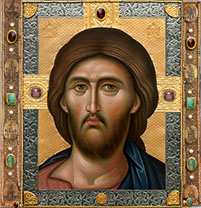 click here for icons of christ
click here for icons of christ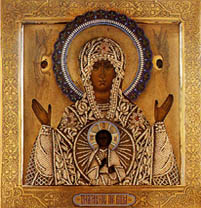 click here for icons of the theotokos
click here for icons of the theotokos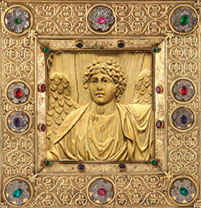 click here for icons of angels
click here for icons of angels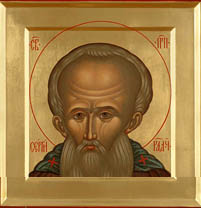 click here for icons of saints
click here for icons of saints








